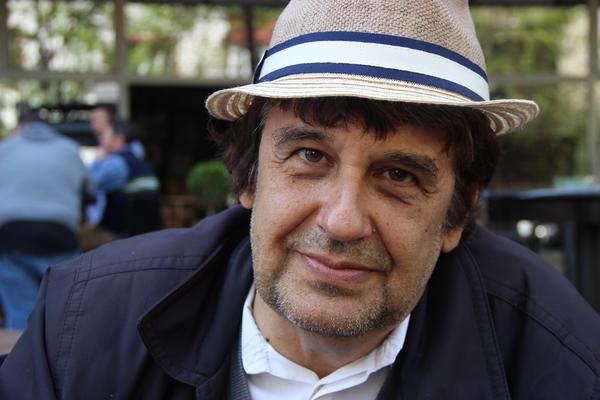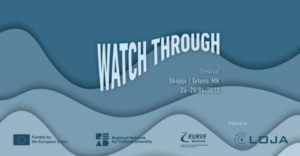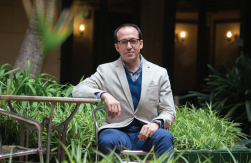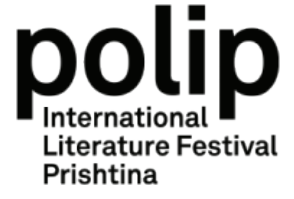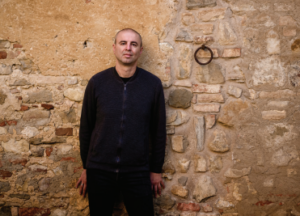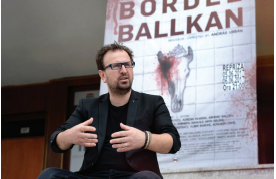Aleksandar Prokopiev, born in 1953 in Skopje, is one of he most well-known Macedonian writers. He graduated in 1977 at the University of Belgrade Faculty of Philology, General and Comparative literature department, and finished postgraduate education in 1982 also in Belgrade and in Sorbonne, France. He worked in several domestic and foreign magazines, for example as a member of the editorial board of Orient Express (Oxford, UK) and World Haiku (Kyoto, Japan) and wrote books of fiction, poems, essays, screenplays for film, theatre, TV shows, radio dramas and comic books. His works are translated in English, French, Italian, Japanese, Russian, Polish, Hungarian, Czech, Slovak and other languages. Alexandar Prokopiev is one of the founding members of Academia Balkanica Europeana.
He can’t remember when he first got concerned with security situation in Macedonia. It might have been four or five years ago when he was still driving his “Volkswagen”. It’s true; it is then that more and more tables in “Dal Met Fu” started being occupied by party cronies. He overhears how the players of both teams, VMRO and SDSM, alternately praise themselves and denigrate each other than the footballers from the national team or the basketball players from “Rabotnichki”. He is flying back home from Ljubljana (the student connections became business connections). He transfers himself and the suitcase into his “beetle” at the car park in front of the airport, sets off towards Skopje and turns on the radio. It is around 3:40 in the afternoon, so he catches the news half way through, the Skopje news. The radio announces that stolen Albanian uranium has been discovered in a basement of a house in Vlae, beside a barrel of sauerkraut. The next news is about the iron curtain in the National Theatre that fell during the second act of last night’s performance of “Giselle” and broke the left arm and right leg of the ballet newcomer Boro (he can’t remember his surname). The director of the National Theatre stated that the curtain had so far functioned without any problems and that this was the first time that something untoward had happened. Then an interview followed with a renowned women painter from Belgrade, a former participant in the “Mediala” movement, and today a hit with the private galleries and the managerial offices of successful companies. Unlike the interviewer, whose voice is quivering on the air, she, if he remembers well, sounds slow, even tranquil: Well, Skopje is super… super. I am… very pleased. It is inhabited by people… people of good taste. And money, he adds for himself. He imagines the opening of her exhibition. A carpet unfolded in front of the Museum of Skopje. On the carpet, businessmen, armed with mobile phones, accompanied by their wives with wide Hollywood smiles, just come out of their large cars parked in front of the Museum. The odd poodle or Pekinese show off on the carpet, because in their dog’s vanity they understand that the exhibition is the right place for them to be seen, too.
The only thing missing is Bulgakov’s Voland!
And then it occurs to him, still listening to the news in the “Volkswagen” (he is going to sell that pile of rot next year) and driving to Skopje that something or someone is not exactly sound in this country. The radio seems to have guessed his thoughts. The art and entertainment news effortlessly glides into the next slot, dedicated to crime: the accused, the owner of a chain of privately-owned exchange offices in the capital and throughout the country, during a hearing session in the Second Municipal Magistrate Court, threw a hand grenade at the magistrate Lenche (he definitely remembers names better than surnames), but she did not get confused and with a volley hurled the bomb back at the other end of the courtroom. Several of the witnesses suffered minor injuries. In the Balkans we men are more handsome than the women!, the bomber managed to shout out while being escorted out of courtroom.
Today, when the city and the state have got used to the everyday news of violence, the portion of the radio news he was listening to in the “Volkswagen” seems perfectly ordinary. But a few years ago, in the car, he felt as if Orson Wells had moved to town. Although, even at that time, some mind-boggling affairs occurred throughout the city.
– drug dealers issue warnings by leaving fine embroidered mementoes on each other’s faces with broken bottles,
– unknown people are occasionally discovered drowned in the Vardar with ropes under their bruised necks,
– the number of pensioners knocked down on “Partizanska” is estimated at between five and eight a month, etc…, etc…
When he goes pas the traffic sign officially announcing the beginning of Skopje, he opens the window, turns off the radio and increases the speed of the “beetle”. He wants to get back to his flat as soon as possible, a one-bedroom flat, but his, to take a shower and to play his Vivaldi CD.
As far as he can remember, he only listens to the educational programs on the radio. The first thing he hears is that the blue-beaked heron has become extinct in North Pakistan.
* * *
The following direct confrontation with the breached security of my fatherland happens much later, in August 2002, when he takes a cab from Trpejca to Ohrid. Actually, on that morning, he feels no particular desire to remove himself from the large rock at the beginning of the village. He sits on and watches – the lake and the sky. The sky, although some call a section of air space, is one of the prettier things in Macedonia. Especially here, clear, with an occasional cloud or bird, linked to the like from one side and to Galichica from the other. Instead of only for the weekend, he stays in the village for a whole week. He has just had a swim in the lake, in which families of bathers are still jumping, spraying and yelling. The speedboats and fast cars with their stocky drivers with shaven heads and no necks accompanied by their long-legged girlfriends with large tits have not arrived yet. Only a few fishermen are in the water, two in each boat, or solitary in rubber dinghies, facing their like-minded fellows on the coast with their fishing lines, still, and immersed in their pursuit.
He starts swimming breaststroke style, as carefully as possible, so as not to disturb the fisherman (and the fish), and only when he leaves the fishing zone behind does he proceed to front-crawl. When, at every other stroke, he plunges his head in the water, exhaling, and then lifts both his left arm and his head, and when through the drops of water sliding over his face, he sees the backs of the standing and sitting fishermen, together with the village, the mountain and the sky above them, he is taken over by a strong sense that he is in a different life from long ago. Although he knows that these fishermen are not the old ones, with nets in wooden boats, who fished to survive, these are contemporary, fake ones, with the most expensive equipment packed in a small case, like the inventory of a serial killer, but he still can’t, and doesn’t want to escape the all-engrossing feeling of time having stopped, because like this he can experience the water, the rocks, the seagulls, the fish that push through the depths.
So he sits on the hot rock, in knee-length shorts remodeled from his torn jeans and a blue sleeveless T-shirt, still wet underneath them, and a taxi stops in front of him, a beige colored Golf. The driver, pallid (even more obviously against the background of tanned faces around him), with bluish eyes, young but with an already receding hairline, is returning from the border. With his left arm, hairless, jutting out of the open car window, he offers to take him to town for the price of a bus ticket.
Their conversation kicks off swimmingly from the very start: We, the taxi drivers, get our left arms burnt by the sun and the fishermen their right. When it’s hot like this, I cool my arm out of window, like this. And the fishermen, you know, pulls the nets with his right hand.
– What if he is left-handed?
The taxi driver laughs and, still with a grin on his face, begins with his confession. He was in the army the whole of the past autumn. As a reservist. They knew in advance that he had been a taxi driver for a long time, that he knew the roads from Tabanovce to Medzitlija, and so he was assigned to the car pool. He was in charge of a “Lada” and an “Ermine” people carrier. The “Lada” was for the transport of the officers, while the “Ermine” was for the ordinary soldiers. The “Ermine” felt like a can of Coke, especially when shot at.
Once, he was sent on an assignment in Matejche – to give a lift to an American cameraman and a British women journalist who wanted to interview the “fighters”. The safe arrival of the foreigners was arranged from both sides and they drove to the village without being stopped, although he had feeling that there was someone watching them from behind every bush. At the entrance of the village, they were met by some commander, freshly shaven, spruced up in a clean uniform, who in excellent English sent them to a largish house guarded by a group of armed people knocking about. Without a word they took him to a small hut next to the road. He was stunned with fear when a frowzled uniformed man met him inside, but soon relaxed when he learned that he was a local Albanian who spoke Macedonian in the Kumanovo dialect. He even offered him some tea in a friendly manner and started a jolly monologue about football. He was relieved but still apprehensive of the threatening bearded and armed guys outside. After sitting there with pins and needles for what seemed to him a very long time, several armed guys came in and, again without a word, took him back to the “Lada” where the foreigners were already waiting for him. On their way back, Angie (that was the journalist’s name) started chatting about her Serbian housekeeper as if to justify herself for being forced to co-operate with the other side. He was silent for no other reason than fear of driving over a mine on the road.
Four months later, he was back in Ohrid, in his parents’ house. At first, he wasn’t even aware that he was home. While in the army, he slept in the vehicles, intermittently, for two or three hours at a time, and since his return he had kept waking up the slightest noise and could only go back to sleep after lighting a cigarette. In the first fifteen days he wasn’t in a fit state to think about what had happened, but later he was overwhelmed by thoughts of the type “what if this happened…” He still jumps when he hears a shot nowadays and starts shaking like an idiot. Before the army he used to like guns and shooting and often visited shooting clubs to practice. But after 200 he could never ever hold a gun in his hand.
He feels better, much better now. He’s got a big garden around the house, he “works it” now. What can I do?! One has to make a living. So I planted kiwi trees.
– Can they grow here?
– Of course they can, I didn’t know it either. I have an entire orchard at the back of the house. It calms me down as I watch them grow, I talk to them. I got some broccoli seed from Croatia. There is a market for it, gets a good price. But Ohrid people don’t eat broccoli, I have to find a van to take them to Skopje.
(Translated from Macedonian by Marija and Matthew Jones)
Aleksandar Prokopiev (1953, Skoplje, Macedonia), Macedonian short-stories writer, novelist and essayist. Until now he has published close to fifteen books of prose, some of which were translated into english, turkish, italian, polish, french… as well as into all the languages of the Balkans. He has been included in regional and European anthologies of short stories and essays. He teaches at the postgraduate Cultural Studies at the University of Skopje. The author in 2011. received the internationally renowned award “Balkanika” for one of his last books, “Homunkulus” (a collection of adult fairy tales) in which Prokopiev combines the erotic, tragic, absurd and humor.
Beside literature, Prokopiev has notable experience in other forms of team creativity: in his youth he played rock’n’roll, later he became a member of alternative theater groups, and in the last few years he has been writing scripts for animated films, which have been awarded at some famous international festivals like those in Rome and Budapest.

